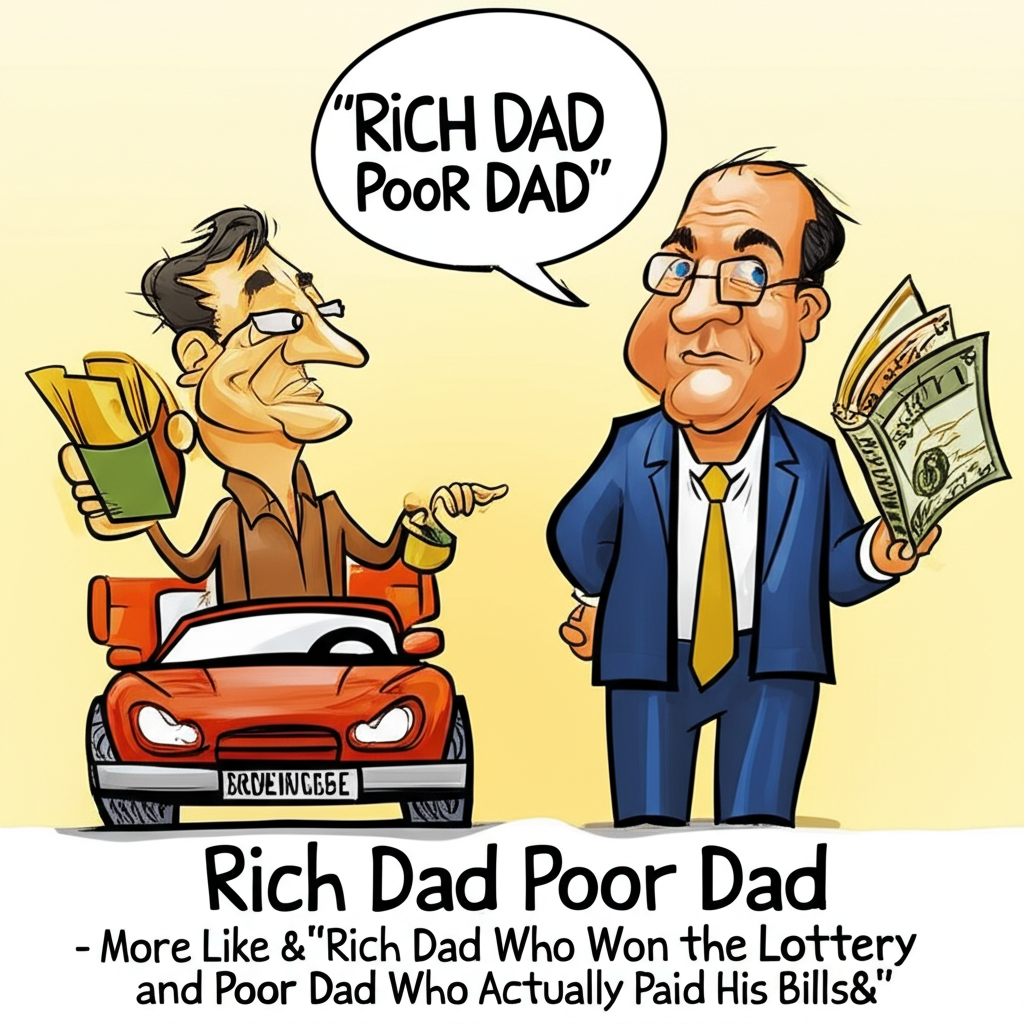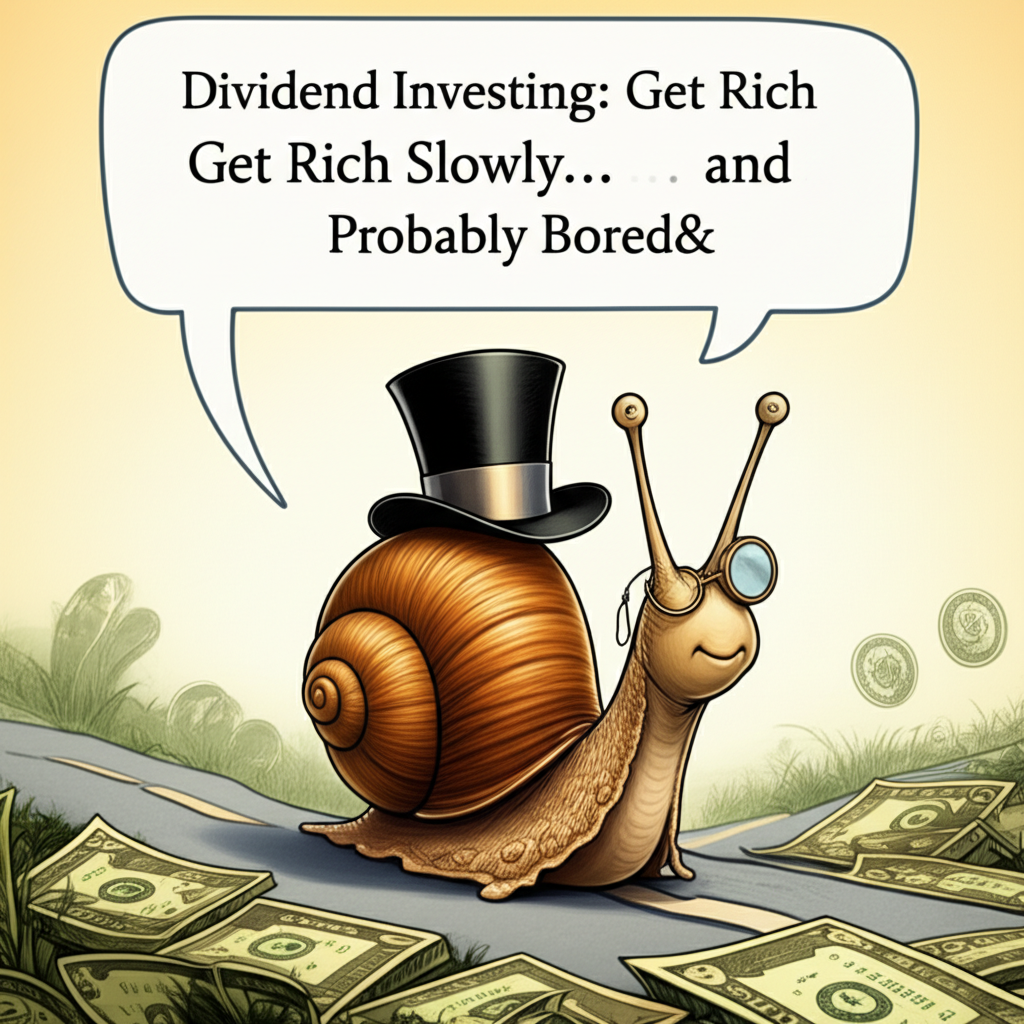
Article 1: "Rich Dad Poor Dad" – More Like "Rich Dad Who Won the Lottery and Poor Dad Who Actually Paid His Bills"
Okay, let’s be honest. "Rich Dad Poor Dad" by Robert Kiyosaki is the financial equivalent of that friend who claims they got rich by "working hard" but conveniently forgets to mention the hefty inheritance they received.
The premise is simple: Robert had a "rich dad" (his friend’s dad, a business owner) and a "poor dad" (his actual dad, a highly educated government employee). Rich Dad taught him about assets and liabilities, while Poor Dad taught him about…well, working hard and getting a good education. Sounds reasonable enough, right?
Except, the advice often boils down to:
- "Buy assets!" (No duh, Bob. But where am I supposed to get the down payment for a rental property when my biggest asset is a slightly dented 2008 Honda Civic?)
- "Don’t work for money, let money work for you!" (Easier said than done when the only "working" my money does is slowly draining my bank account through subscription services I forgot to cancel.)
- "Start a business!" (Great! I’ll just magically invent the next iPhone while juggling my soul-crushing 9-to-5. My boss will love that.)
The book is less a practical guide and more a motivational speech disguised as financial advice. It’s like a financial pep rally led by a guy wearing a "I <3 Cash Flow" t-shirt.
Verdict: Read it for the inspiration, but take it with a grain of salt (and a hefty dose of realism). It’s a good starting point for thinking about money differently, but don’t quit your job and invest your life savings in a "cash-flowing" vending machine just yet. You might end up being a "Poor Dad" yourself, selling lukewarm Snickers bars in a parking lot. And nobody wants that.
Article 2: "The Total Money Makeover" – Or, How to Become Dave Ramsey and Make Everyone Around You Uncomfortable
Dave Ramsey. The name conjures images of debt-free screams, envelopes filled with cash, and a distinct aroma of tough love. "The Total Money Makeover" is his financial bible, a no-nonsense, tough-as-nails approach to getting out of debt and building wealth.
Here’s the Ramsey recipe:
- Baby Step 1: Save $1,000 for a starter emergency fund. (Good luck with that in this economy. My "emergency fund" is currently a half-eaten bag of chips and a prayer.)
- Baby Step 2: Attack all debt (except the house) using the debt snowball. (The debt snowball: paying off your smallest debt first, regardless of interest rate. It’s like attacking a giant snowball with a toothpick, but hey, at least you’re doing something.)
- Baby Step 3: Save 3-6 months of expenses in a fully funded emergency fund. (Okay, Mr. Ramsey, I’ll just magically conjure up enough money to survive for half a year without income. No problem!)
- Baby Steps 4-7: Invest, pay off the house, give. (Ah, the promised land! A life of debt-free bliss and philanthropic endeavors. I’ll get there… someday…)
The problem? Ramsey’s approach is, well, intense. It’s the financial equivalent of a drill sergeant yelling at you to drop and do 20. And it can make social interactions…awkward.
Imagine:
- Your friends want to go out for dinner. You: "Sorry, I’m on the Baby Step 2 and can only afford to eat ramen noodles at home."
- Your coworker asks you to contribute to a birthday gift. You: "I’m sorry, but my envelope system doesn’t have a ‘Birthday Gift for Brenda’ category. Perhaps a heartfelt, debt-free card?"
- Your family suggests a vacation. You: "Vacations are frivolous! We’re paying off the mortgage! We’ll visit Disney World in 20 years… maybe."
Verdict: Ramsey’s methods work for a lot of people. His emphasis on discipline and debt elimination is commendable. But be prepared to become the financial buzzkill of your social circle. Just remember, you can’t put a price on friendships…unless it involves contributing to Brenda’s birthday gift. Then, maybe you can offer to bake her a debt-free cake. Just kidding (mostly).


Post Comment